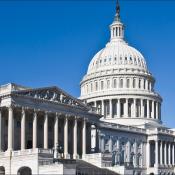***Due to Blogger's new format change, there are random changes font size and colors***
America has been engaged in so-called "nation building" since World War II ended in 1945. It all started with the Marshall Plan, named after its originator, former General George Marshall. The intent was simple enough; to keep Europe, which had been devastated by 12 years of war, from a total collapse. Not only was Germany a heap of ruble, but so was most of the rest of Europe, from France in the west to the Soviet Union in the east and from Sicily in the south to Norway in the north.
As a result of mistrust and rapidly rising tensions between the former wartime allies, Stalin refused to allow the U.S. to deliver badly needed supplies, including drinking water, food, and medical supplies, to countries under its control. Part of the reason was enforce its dominance over these countries and in the case of West Berlin, to force the Allies out; this abandoning West Berlin to the Soviets.
Of course, around the clock airdrops by the Americans ensured that West Berliners were able to stave off Soviet imposed starvation. Meanwhile, American supplies flooded the rest of Europe, including England which had been brought to its knees by the war. Not only were food, fresh water, and medical supplies delivered, but so was everything imaginable to rebuild Europe, from concrete and construction equipment to manufacturing machinery to ordinary consumer goods.
Not only did the U.S. save Europe from economic and social collapse, it also did the same for Asia, including its former enemy, Japan. As a result, not only did America emerge from WWII as the most powerful military power in the world, but also as the most powerful economic nation on the planet. It was at this time that the U.S. began flexing its newfound global muscle.
At the same time, the Soviet Union, our former ally, was engaged in an all out attempt to compete with the U.S. by stripping the countries it occupied of everything of worth, from technology to scrap metal to scientists and engineers. The "Cold War" was on. From there on out the two countries would be engaged a war of wills which would involve trade wars, embargos, proxy wars, and competing propaganda. Each would do its upmost to infiltrate and undermine the other at every opportunity.
During this period, both nations focused on influence expansion by attracting allies. Part of this involved the concept of "nation building". Nation building was an attempt to help developing countries (often newly independent former colonies) create new governments complete with infrastructures and militaries. It was essential in keeping or pulling a country from the other's political orbit.
Like the U.S., the Soviet Union, sponsored campaigns and candidates in addition to aid. Once a friendly government was installed (some were elected as in the case of Chile or Argentina or the result of a guerilla insurgency as in Cuba or Angola). The war in Vietnam was more complicated. It was, in fact, a civil war as much as a ideological war. The Communist North was supplied, trained, and occasionally aided by "volunteers" from the USSR and China. The same for North Korea in that war.
As for America, we relied less on elections and more on backing military coups and juntas. If there was an election that we opposed, we did our best to disrupt it by discrediting the opposition, and if that didn't work, we would often support an overthrow of the government which often included assassinating it president and other key figures. This was what the world saw as our "spreading American democracy" which was often hidden from the America Public.
Meanwhile, powerful American corporations would step in to seize....I mean negotiate...control of natural resources or economic markets. Anyone who objected (and couldn't be bribed) were typically intimidated with threat of U.S. military might. They would usually be denounced in the media while trade would suddenly be reduced to a trickle or aid was cut off as a case was manufactured to depose them (usually involving alleged civil rights violations) as a precursor to a U.S. sponsored coup.
At this point, most leaders simply took the bribe and looked the other way. As an aside, the truth about civil rights violations was usually true. However, as long as they cooperated, it was officially ignored. Case in point---Saddam Hussein, Augusto Pinochet or Jorge Videla. In time this corporate-government partnership became a merger of sorts into what we have today---a Corporatocracy comprised of interconnected plutocrats, or to put it much simpler, an Oligarchy.
As for our efforts at nation building, the U.S. Government spent billions if not trillions aiding countries into developing capitalistic democracies. Yet, despite all the money spent (that is, taxpayer money) how many countries do you think developed a government based on the U.S. model? Take a guess. We'll come back to it shortly.
Obviously for the Corporatocracy to succeed, it was necessary that both political parties be brought under its control. Controlling one party just so the other could undo everything or worse, rat them out wouldn't do. As a result, they slowly worked to oust anyone who wouldn't play ball. That included the majority of the moderates on both sides.
It also included anyone with pesky morals (some still exist, but they're a small minority and can do little). As former Speaker of the House, Sam Rayburn famously said, "To get along you have to go along". Is it any wonder that the majority of Congress are multimillionaires? If they weren't went they first went in, they either soon became one by going along or they weren't reelected. How do you think that happens?
Now back to my question. How many countries adopted the U.S. model of government? The answer is zero. Nix. Nada. Goose egg. Instead, they adopted the English parliamentary or proportional representation form of government. It allows every party to have seat based on the percentage of seats it won in the election. Thus, everyone still has a say even if their party didn't win a majority of seats.
Under the U.S. model, it's a "winner take all" form of government. That means if your party won, you theoretically have a voice (in truth you have no voice). If not, then you're out of luck. You have no representation. Doesn't sound real democratic does it? Some people will argue that the English system is chaotic, cumbersome, and causes deadlocks. To that, I point to Washington and Congress as prima-facie evidence when it comes to legislative logjams.
While the U.S. has mostly gotten out of the assassination business, it's still involved in removing governments and individuals that impede corporate interests. We are still involved with acquiring natural resources, forcing open markets, and so forth, though we might say "please" first. It reminds me of a quote from Chicago mobster Al Capone. He once said "You can get further with a kind word and gun than just a kind word". That kind word is now America's economic and military might.
Meanwhile, America has moved closer to becoming a fascist police or security state. Anyone past the age of 50 cannot look back and say this is the same country they remembered when they were 20 or even 30. Our education system has been repeatedly dumbed down. We have less to say about government policies or tax increases. They had ridiculed and demonized any and all political or social alternatives.
Our infrastructure is fracturing and collapsing. Most cities are struggling to survive. Many are imploding due to mismanagement. A few have become nothing short of cesspools where people routinely urinate or defecate on sidewalks, live in parks, and scatter used drug needles everywhere. Up is down. Right is wrong. Alice would feel right at home.
Politicians, once elected, are virtually impossible to remove no matter how poor their job performance thanks to partisan gerrymandering. Unrestricted campaign financing (thanks to Citizens United and wrongly labeled as "free speech") has all but removed ordinary citizens from the process. That's why we need to eliminate Citizens United and the concept of corporations as having the same (or greater) rights as people. It's why we need to impose term limits on politicians. Ranked choice voting wouldn't hurt either.
Corporate power within government is near absolute. It controls virtually everything, from legislation to regulation. It dictates both foreign and domestic policies. Meanwhile, we continue to lose our freedoms precious piece by piece. We are monitored constantly. Our opinions are shaped and manipulated by a cooperative media. We "vote", but only from a small cadre of pre-vetted candidates. Don't believe me?
Ask yourself why, out of 323.2 million Americans, is it that Biden and Trump are the best each party can produce? Can't San Francisco/Oakland/Sausalito do any better than Nancy Pelosi, Diane Feinstein, or Kamala Harris? Was Dick Chaney or George W Bush the best the GOP had? How did someone like Barack Obama, with little to no professional or political experience become president? I could go on and on regardless of political party. I bet you can too.
With Independents comprising the largest political bloc in this country, why are they and third parties blocked from getting on the ballot or participating in the debates by both parties. What are they afraid of? Why do they have to jump over barriers the other two don't have? Not much of a free and open democracy is it?
Regardless of the outcome of this election in November, very little of substance will actually change. The elites will get back to business as usual. Some of Trump's accomplishments will be overturn (unless it can be perverted to serve their interests somehow). Individuals like Hillary Clinton and Obama will be restored to their former pedestals while their past transgressions will be securely buried forever.
However, there are things we can do if we work together. As voters, we need to ensure that our voices are heard. We need citizen based ballot initiatives or referendums. We must have the final say on any tax or rate increases no matter how large or small. It's our money, not theirs. Same holds true for salary increases of elected officials. We need to end partisan gerrymandering by establishing independent ad hoc boards to draw the districts based on the latest census records. We also need to impose term limits.
We must remove all barriers to Indies and third parties. What's good for the Democrats and Republicans is good for everyone seeking an office. They must also open all debates to every candidate. They should be given the same coverage by the media. In short, elections must be fair and open. We must end Citizens United. Corporations are not people. They don't deserve the same rights. We also need to end corporate funding of elections, be it direct or bundled. They should also not be allowed to "help" write legislation.
Political offices which are not engaged in legislation should be non-partisan. This includes offices like Secretary of State, Treasurer, County Clerk, Auditor, County Attorney, Attorney General, Circuit Court Clerk, Secretary of Agriculture, and County Sheriff. Judicial offices are supposed to be non-partisan, but often they're not. Therefore, they should be required to declare their registration.
If we can do this, we can take a huge step forward into repairing our broken system, and that could help returning this nation to what it was intended to be---a Constitutional Republic.





1 comment:
AMEN x 100!
Post a Comment